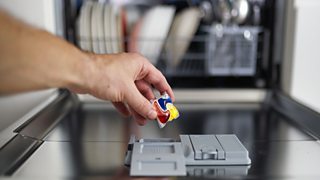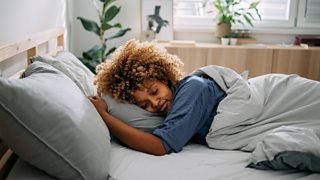Are these 'must-have' products worth putting on your Christmas list?
At this time of year, we are bombarded with adverts for products claiming to help improve our lives or make everyday tasks easier. But are they really worth the money?
In a special Christmas episode of Βι¶ΉΤΌΕΔ Radio 4's Sliced Bread, presenter Greg Foot discovers which of these so-called wonder products deserve a place on your festive wish list, by doing what they say, and which should be put on Santa's naughty list.
He takes a look at five items that you could be considering as potential presents for you or your loved ones – perfume, running shoes, DNA ancestry tests, mascara and air fryers.
Will forking out for these products make you healthier, happier or greener – or are they just marketing BS?
Air fryers
For the last few years, people have been preaching the power of the air fryer. But are they worth the hype?

Molecular biologist Dr Jakub Radzikowski explains that an air fryer works in much the same way as a conventional fan oven, by “blowing hot air at a very high speed” around your food. However, the fan is more powerful and the cooking compartment is smaller, “so that makes the whole device more efficient.” A chicken thigh will take just 20 minutes to cook, and the air fryer doesn’t need preheating like a conventional oven.
So, will an air fryer reduce your energy costs? Using a smart metre to measure the energy used, Greg cooked a chicken leg and baked potato in an air fryer and an oven. With both items, the air fryer took half as long and used less than half as much energy. But – and it’s a big but – if you’re cooking for four or more, the time and energy saving won’t apply because you will need to cook in a few batches.
If you are considering an air fryer for Christmas, choose carefully. Models vary wildly in price and functionality. Helpfully, Βι¶ΉΤΌΕΔ Good Food magazine ran some tests. “Cosori as a brand came out really well as best value standard size but also best for affordability in general,” states Senior Reviews Writer Anya Gilbert. But if money is no object, then the Ninja Foodi MAX Health Grill & Air Fryer was a really highly rated model. Pricier, but with “bells and whistles” like an integrated meat thermometer.
The air fryer can’t ever fully replace an oven – you’ll never be able to cook your whole Christmas dinner in one – but “it’s a great little invention,” says Jakub. Anya agrees: “I think air fryers are a really exciting gadget.”
Read more about Greg's investigation. And listen to the Sliced Bread air fryers episode in full here.
Mascara
Make-up can be expensive, which is why it often ends up on people’s wish lists. But can mascara really make your lashes longer, fuller or curlier as many brands promise? And will a more expensive mascara do these things better?
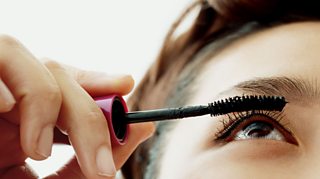
“Mascara is fundamentally an emulsion,” explains cosmetic chemist Tumi Siwoku. It’s made up of oils, waxes, water, polymers, preservatives and – most importantly – a colourant.
Some of the claims manufacturers make are true. The black, in contrast with your skin tone, can make your lashes appear longer or thicker. Then there are lengthening mascaras where added fibres or ‘film formers’ will stick to your eyelashes. “The more you apply the longer your lashes get,” explains Tumi. And some mascaras are thicker with wax, making your lashes appear fuller. The type of brush is “equally important,” says Tumi. “I think the formulations are designed for the brushes.”
Any curl claims, however, are inaccurate. “Although we can get a lash curler, we can’t make your lashes curlier with mascara,” says the chemist.
Are more expensive mascaras worth splashing out on? “It’s a bit like having white bread versus artisan sourdough,” says Tumi. “The experience is different even though they both do the same thing.” A budget range will contain the bare minimum, “but it would serve its purpose in the sense that it will darken and enhance your lashes.” With the high-end, luxury mascaras you’re paying for the time, research and development invested in them. But the “mid-range, mass market products” can be a good-quality alternative.
Really, choosing a mascara should be about understanding what ingredients are irritating or harmful to you and your lashes, explains dermatologist Emma Craythorne. “If you’re somebody who has sensitive eyes then products that have a lot of preservatives within them are best to be avoided.” If your eyelashes are dry or brittle then avoid waterproof mascara. And the fibres sometimes added as a lengthener can also be irritating for the eyes. “Like most things in the cosmetic industry, expensive does not always mean better,” argues Emma.
To decide whether designer mascara should make your Christmas list, listen to the episode here.
Perfume
What makes one perfume cost a tenner and another over £100? Can expensive fragrances be successfully cloned or are the designer brands worth the extra cash?
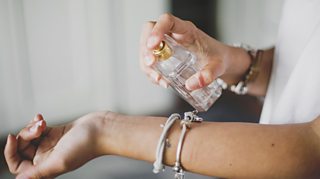
A high price point will come from a combination of the ingredients, the branding and the bottle. “It’s known in the industry that the look sells, so a lot of effort does go into the packaging and the branding and the marketing,” explains Artisan perfumer Sarah McCartney. Compounding something will take longer if there are more materials, so that will up the price too. (Although it’s worth noting that all fragrances – whether cheap or pricey – are made from the same range of chemicals.)
YouTuber Chris Wilkinson has tested loads of perfumes across all different price points. He explains how ‘clone houses’ that imitate high-end luxury fragrances, can get very close to the real deal. They use a process called gas chromatography, which will tell them every single molecule that’s contained in a fragrance. Some clone houses will then use a perfumer to check the smell and tweak the recipe. High street stores are doing the same. “They are creating smells, probably very cheaply, that they know sell,” says Chris.
Greg did a sniff test and, with the price difference in mind, four out of five people said that they would buy the clone over the original. So, are more expensive perfumes SB or BS?
If you’re only concerned with smell, and you’re not a fragrance fanatic, clones are close enough, says Chris. If £250 is too much for you to spend on your favourite scent, “get something that’s similar,” agrees Sarah.
Really, it’s personal mindset that matters. It might be that your fragrance collection and the “full experience” – including luxury presentation and years of research – is important to you, says Chris.
“I think original perfumes are the best thing since sliced bread,” stresses Sarah.
To learn more about Greg's sniff test listen to the full episode on perfume here.
Running shoes
Choosing new running shoes can be perplexing, with an enormous range of styles and price-points on the market. Can more expensive trainers reduce your risk of injury, and help you run faster?
A pricier trainer might offer more cushioning, but more is not necessarily better, explains biomechanics Dr Hannah Rice: “When it comes to injury risk, we don’t know that more cushioning is better for you.”
Runners have been encouraged to match shoes with their individual gait and pronation pattern, but research shows that your “skeleton will follow a particular path during running and you’re not really able to change it with footwear,” says Hannah. An expert in the physiology of running, Joe Warne, agrees that matching your gait to your trainers is “a completely bogus activity”. A recent study found that runners who experienced gait analysis were four times more likely to get injured.
One footwear innovation that actually could improve your PB is an integrated carbon plate. These can help maximise the amount of energy propelling the foot and body forward. We’ve seen an increase in the number or world records since these shoes became adopted by the pros, explains sports technologist Professor Mike Caine. However, unless you’re intending to race, the high price point for these super shoes probably isn’t worth it. “It’s definitely worth spending more if you want a superior product,” says Mike but “for your average recreational runner, I don’t think it’s worth spending more to get up to the carbon fibre plate type technologies.”
Generally, there’s no evidence that more expensive trainers help performance or reduce injury risk. At the end of the day, comfort should be the key factor when it comes to what shoe is right for you.
Read more about Greg's findings here. To hear more about the science of running shoes listen to the full episode here.

DNA ancestry tests
DNA ancestry tests promise to help you plot your family tree, find long-lost relatives and uncover your family heritage. It’s no wonder they’ve become increasingly popular as a Christmas gift. But how accurate are these tests? And is it safe to share your DNA with these companies?
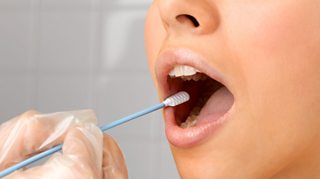
Results will come in the form of percentages – you might be told you’re 12% German or 1% Portuguese, for example. “We don’t know exactly how they do the analysis, so it’s pretty difficult to critique,” explains Professor of Genetics Mark Jobling. What we do know is that the companies often use their own customers as their reference database. This means your results are reliant on other people accurately defining their own nationality. Be aware too that, scientifically, we would expect a margin of error around any percentages. 1% Portuguese could in reality be zero!
Crucially, because of the way DNA is passed down, there’s a limit on how far back you can trace your ancestors. “It’s not long before you will have ancestors in your tree who are really their genealogical ancestors, but they’re not genetic ancestors because their DNA won’t exist in your own genome,” explains genealogist Louise Baldock.
What these companies can do is help you find living relatives, by matching segments of your DNA with others in the database. “This whole process of kinship detection is much more reliable than the ancestry detection,” says Mark.
Can our DNA be misused? If an individual had “skeletons in the cupboard”, that information could in theory be used against them, in the wrong hands, says Mark. But although there have been some recent high-profile cases of ancestry sites being hit by data breaches, there’s little to no evidence of this kind of nefarious activity by the companies themselves. “I feel it’s largely safe,” reassures Louise.
So, SB or BS? When it comes to helping you find unknown relatives, these tests are better than sliced bread, says Louise: “It’s a life-saver for some people.” However, the ancestry elements of these tests are “often misleading and very opaque,” stresses Mark, and results should be taken with a “major pinch of salt”.
Listen here to decide whether a DNA ancestry test would be a wonder product for your family.
And to discover what Greg uncovered about many more so-called wonder products – including a very special 100th episode on longevity supplements – listen to all the previous episodes of Sliced Bread on Βι¶ΉΤΌΕΔ Sounds.
The information contained in this article was correct at the time of broadcast on 9 December, 2024.
More articles from Sliced Bread
-
![]()
Should you buy a real or artificial Christmas tree this year?
Greg Foot investigates Christmas Trees. Listener Eleanor wants to know which is better for the environment - real or fake?
-
![]()
Are expensive dishwasher tablets worth the money?
Greg Foot investigates dishwasher tablets. Do more expensive ones give you a better clean and protect glasses better?
-
![]()
Can anti-ageing supplements help us to stay young?
Greg Foot investigates the pills and supplements that claim to help us to live longer and more healthier lives.
-
![]()
What type of mattress gives you the best night's sleep?
Greg Foot investigates whether the claims made by manufacturers of mattresses live up to the hype.


